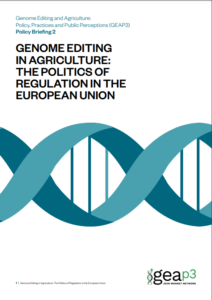- Published 18/09/20
This policy briefing was published by the GEAP3 Policy Hub

Genome editing, also known as gene editing, is a technique of genetic engineering that involves the alteration of an organism’s genetic structure by adding, deleting, changing or replacing individual nucleotides or sequences of DNA.¹ Genome editing includes several different methods and tools, which can be used by breeders to alter the traits of crop plants and livestock animals. Genome-edited crops and food products are beginning to be commercialised, which raises questions around how the techniques and products of genome editing should be governed.
This briefing discusses the governance of genome editing and its products in the European Union (EU). The future of the EU’s rules could have significant implications for agricultural and food systems within the European single market, for the bloc’s trading relations with the USA and other countries, and for African countries that want to export agricultural products to European markets. The EU has been under pressure from within and without to change its current approach. Stakeholders from science and industry argue that European regulators should adopt a more permissive approach. Foreign governments, notably the United States, argue that the EU’s rules governing genetic engineering techniques are excessively restrictive and constitute a barrier to trade. However, environmentalists and consumer groups insist that stringent regulation of genetic engineering technologies is appropriate, justified and democratically legitimate.
[1] DNA stands for deoxyribonucleic acid, a type of molecule often referred to as the genetic ‘building blocks’ of life.